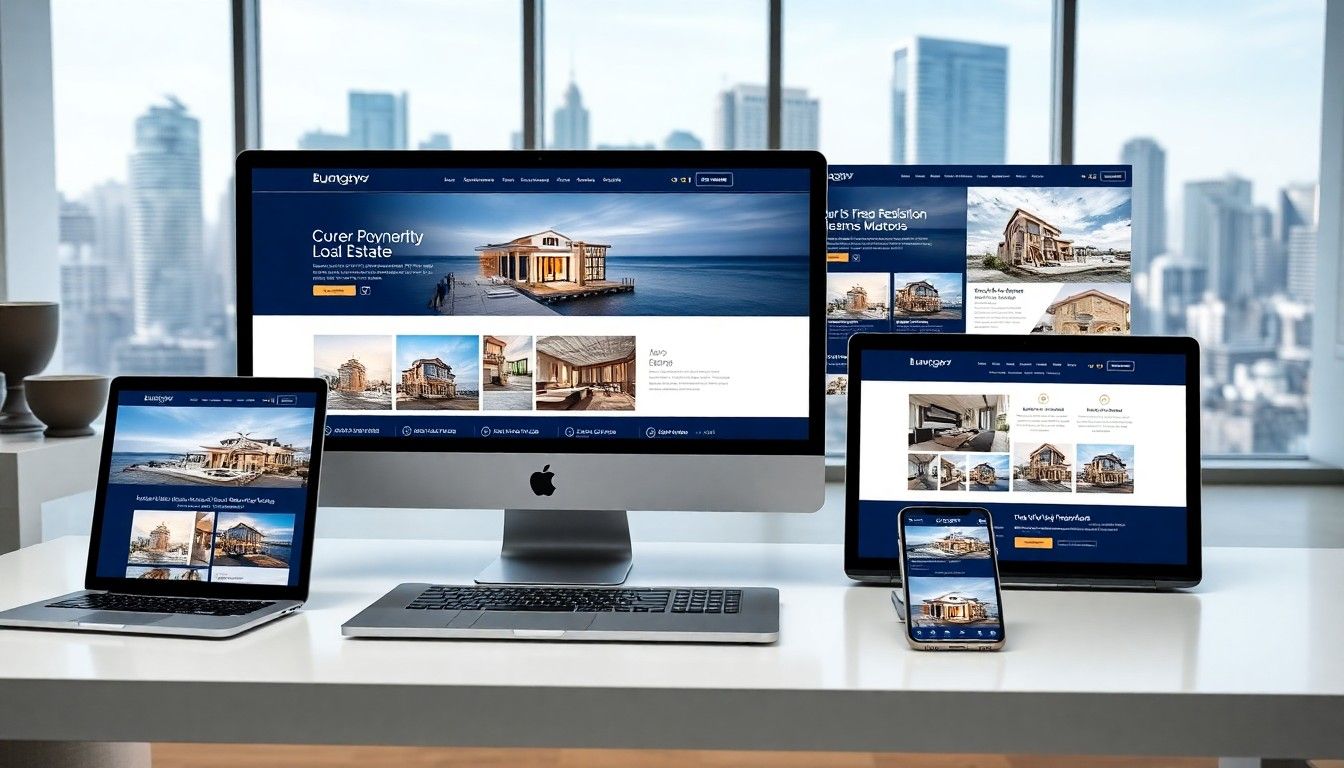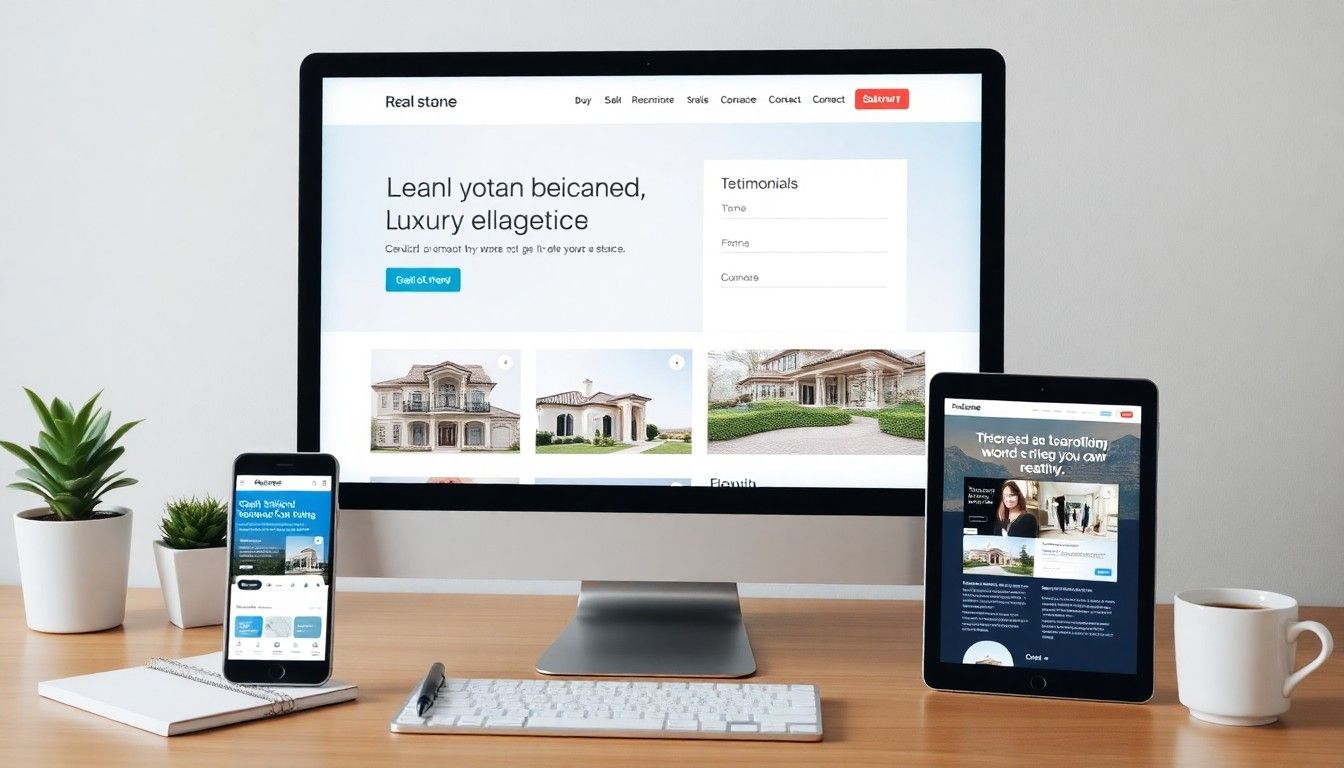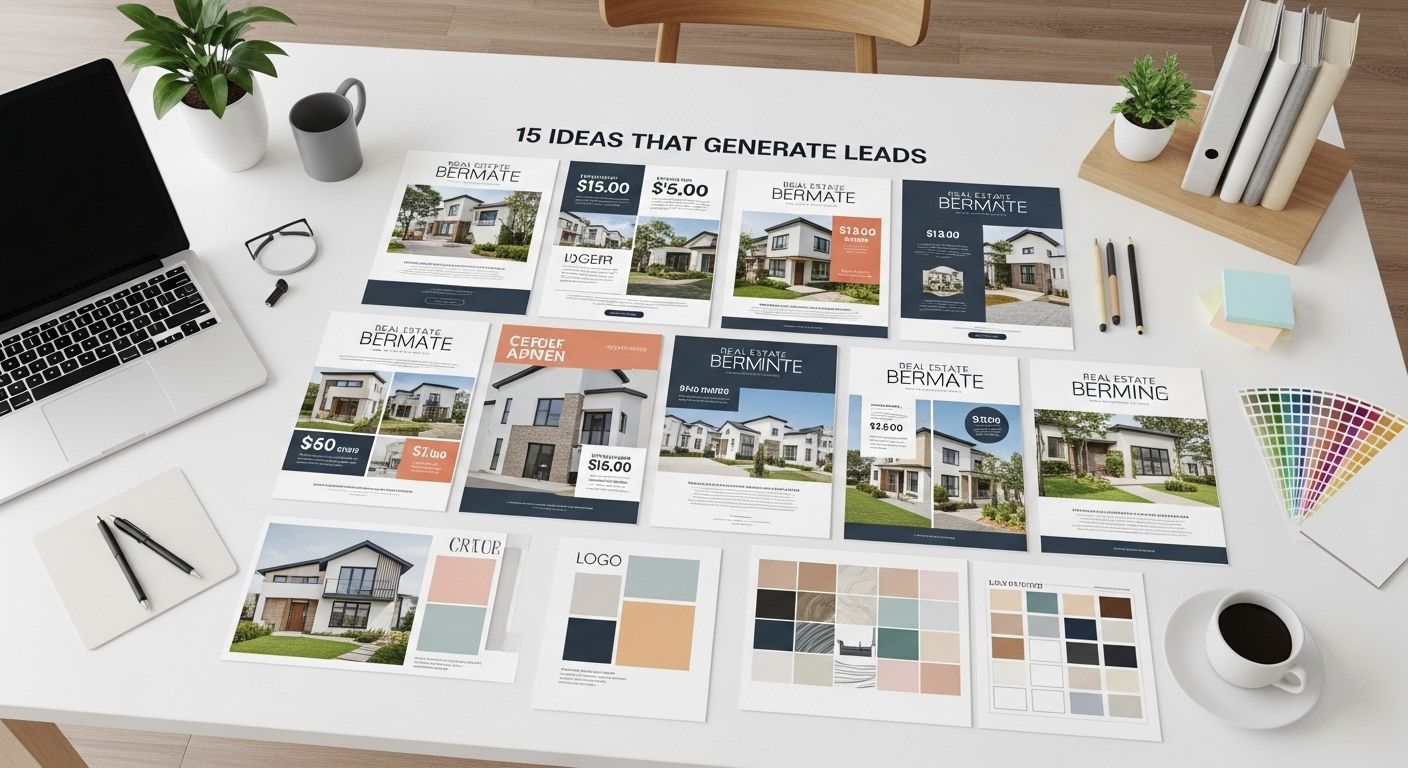Estate Agent Digital Marketing: 7 High-ROI Strategies That Actually Work

Estate Agent Digital Marketing: 7 High-ROI Strategies That Actually Work
Digital marketing transforms property sales when executed strategically.
Real estate agents now allocate 54.2% of their marketing budgets to digital channels (Source: AgentExtra). This significant investment demands measurable returns and proven strategies that deliver results.
Successful estate agents leverage digital channels to showcase properties, engage potential buyers, and generate qualified leads. These strategies go beyond basic online presence, creating compelling digital experiences that convert prospects into clients.
This guide reveals seven data-backed digital marketing strategies that consistently deliver outstanding returns for estate agents. Each approach combines current marketing trends with practical implementation steps, helping you maximize your digital marketing investment.
Whether you're establishing your digital presence or optimizing existing campaigns, these strategies provide a framework for sustainable growth. From search engine optimization to video marketing, discover how to implement these techniques effectively and measure their impact on your business.
What You'll Learn
- How to optimize your digital marketing budget for maximum ROI
- Proven strategies backed by industry statistics and success metrics
- Implementation guidelines for each marketing channel
- Performance measurement techniques and optimization methods
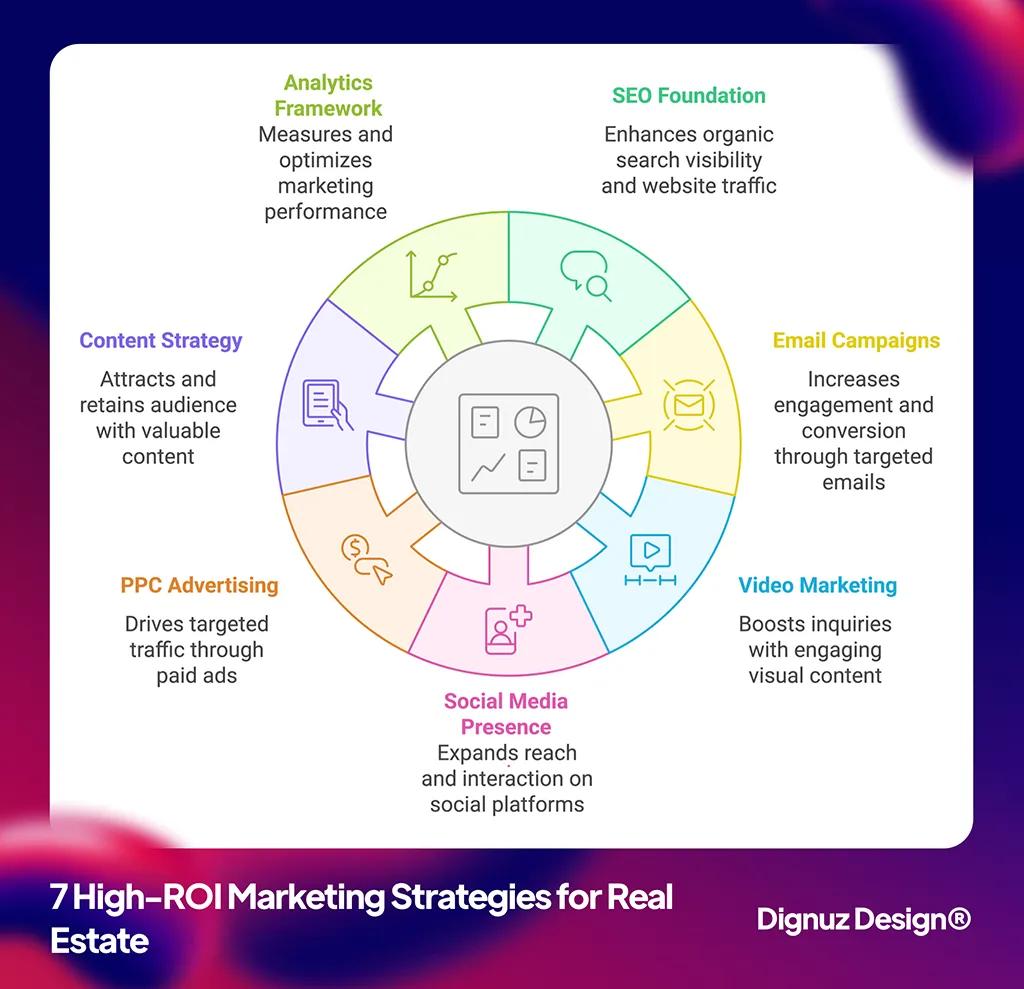
1. Search Engine Optimization (SEO) for Estate Agents
SEO delivers exceptional returns for estate agents, generating over 1,300% ROI within three years (Source: Luca Tagliaferro). This remarkable return stems from SEO's ability to attract qualified leads actively searching for properties.
Effective property website optimization starts with understanding buyer search behavior. Focus on local search terms, property-specific keywords, and neighborhood-related queries to capture relevant traffic. Custom real estate websites consistently outperform template solutions in search rankings.
Key SEO Focus Areas
Technical optimization ensures search engines can effectively crawl and index your property listings. Prioritize mobile responsiveness, page speed, and structured data implementation for property listings. These technical elements significantly impact search visibility and user experience.
Content optimization revolves around creating detailed property descriptions, area guides, and market insights. Each piece of content should target specific buyer needs while incorporating relevant keywords naturally. Regular content updates signal active website maintenance to search engines.
Implementation Strategy
- Optimize property listing pages with detailed descriptions and high-quality images
- Create neighborhood guides and market analysis content
- Implement local SEO best practices for office locations
- Ensure mobile-first design and fast loading speeds
Measuring SEO Success
Track organic traffic growth, keyword rankings, and conversion rates through Google Analytics and Search Console. Focus on metrics that directly impact business outcomes, such as property inquiry forms submitted and viewing requests generated through organic search.
Organic Traffic
- Target Goal: 20% monthly increase
- Measurement Frequency: Monthly
Keyword Rankings
- Target Goal: Top 3 positions
- Measurement Frequency: Weekly
Conversion Rate
- Target Goal: 3%+ from organic traffic
- Measurement Frequency: Monthly
Regular performance analysis helps identify optimization opportunities and areas needing attention. Adjust your SEO strategy based on data-driven insights to maintain and improve your search engine visibility over time.
2. Strategic Email Marketing Campaigns
Email marketing generates exceptional returns for estate agents, delivering $42 for every $1 spent (Source: HubSpot). This powerful ROI stems from email's ability to nurture leads and maintain long-term client relationships.
Successful email campaigns start with strategic segmentation. Group subscribers based on their property interests, budget range, and stage in the buying journey. This targeted approach ensures recipients receive relevant marketing messages that prompt action.
Email Campaign Types
Property alerts form the foundation of real estate email marketing. These automated notifications match new listings with subscriber preferences, delivering timely, relevant content. Complement these with market updates and neighborhood guides to provide comprehensive value.
Nurture sequences maintain engagement throughout the property search process. Create automated workflows that guide prospects from initial inquiry to property viewing, addressing common questions and concerns along the way.
Automation Best Practices
- Welcome sequences introducing your services and value proposition
- Property match alerts based on saved search criteria
- Viewing follow-ups with additional property suggestions
- Market update newsletters with local insights
Content Optimization
Personalize email content using subscriber data and behavior patterns. Include high-quality property images, virtual tour links, and clear calls-to-action. Mobile optimization remains crucial as most recipients check email on smartphones.
Property Alerts
- Optimal Frequency: Daily/Weekly
- Key Components: New listings, price updates
Market Updates
- Optimal Frequency: Monthly
- Key Components: Trends, statistics, insights
Nurture Sequences
- Optimal Frequency: 3-5 days apart
- Key Components: Educational content, testimonials
Performance Tracking
Monitor key metrics including open rates, click-through rates, and conversion actions. Test subject lines, sending times, and content formats to optimize performance. Focus on engagement metrics that lead to property viewings and sales.
Regular list maintenance ensures high deliverability rates. Remove inactive subscribers, update contact preferences, and segment based on engagement levels. This approach maintains list quality and improves campaign effectiveness.
3. Video Marketing and Virtual Tours
Video content revolutionizes property marketing, generating 403% more inquiries than traditional listings (Source: Taylor Scher SEO). This dramatic increase in engagement makes video marketing essential for modern estate agents.
Strategic video marketing on platforms like YouTube transforms property showcasing. Virtual tours, property walkthroughs, and neighborhood highlights create immersive experiences that capture buyer interest and qualify leads effectively.
Essential Video Content Types
Property walkthrough videos provide comprehensive views of each listing. Focus on highlighting key features, unique selling points, and lifestyle benefits. Include both interior and exterior footage to give potential buyers a complete perspective.
Neighborhood showcase videos help buyers envision their future lifestyle. Capture local amenities, transport links, and community features. These videos build confidence in the location and generate stronger emotional connections.
Production Guidelines
- Use stabilized camera equipment for professional results
- Ensure proper lighting throughout the property
- Include aerial footage for larger properties
- Add professional voiceovers or captions
Platform Optimization
Optimize video content for each platform's requirements and audience preferences. YouTube videos benefit from detailed descriptions and proper keyword optimization. Social media platforms require shorter, more dynamic cuts to maintain engagement.
YouTube
- Optimal Length: 3-5 minutes
- Key Features: Detailed walkthroughs
- Optimal Length: 30-60 seconds
- Key Features: Highlight reels
- Optimal Length: 1-2 minutes
- Key Features: Property previews
Virtual Tour Integration
Interactive virtual tours provide 24/7 property access to potential buyers. Implement 360-degree views and clickable hotspots to highlight key features. These tools reduce unnecessary viewings while attracting more qualified prospects.
Measuring Video Performance
Track view duration, engagement rates, and inquiry generation from video content. Monitor which property features and video styles generate the most interest. Use these insights to refine your video marketing strategy and improve conversion rates.
Regular content updates maintain channel freshness and audience engagement. Create a consistent publishing schedule that aligns with your property listing calendar and market activity.
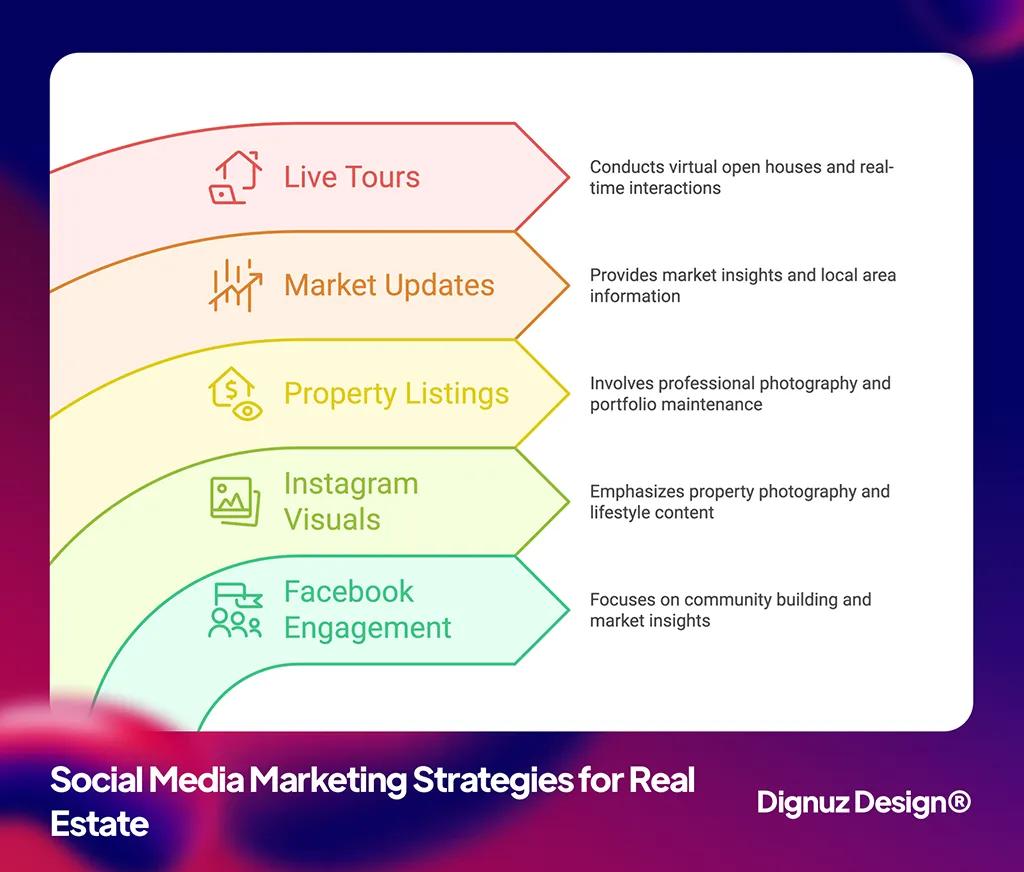
4. Social Media Marketing Excellence
Social media dominates real estate marketing, with 90% of agents utilizing these platforms and Facebook leading at 97% adoption (Source: Taylor Scher SEO). This widespread adoption demands strategic approaches to stand out and generate meaningful engagement.
Success on social media requires understanding platform-specific dynamics and audience behaviors. Following proven social media rules for realtors helps maintain professional presence while maximizing engagement.
Platform-Specific Strategies
Facebook excels at community building and detailed property showcases. Create engaging property albums, share market insights, and utilize Facebook Live for virtual open houses. Groups provide additional opportunities to connect with specific market segments.
Instagram's visual focus makes it ideal for property photography and lifestyle content. Stories and Reels capture behind-the-scenes moments and property highlights, while the main feed maintains your portfolio of listings and successes.
Content Strategy
- Property listings with professional photography
- Market updates and local area insights
- Client success stories and testimonials
- Live virtual property tours
Engagement Optimization
Property Listings
- Best Posting Time: Weekdays 9-11 AM
- Engagement Tactics: Interactive polls, Q&A
Market Updates
- Best Posting Time: Tuesday-Thursday
- Engagement Tactics: Discussion prompts
Live Tours
- Best Posting Time: Weekend mornings
- Engagement Tactics: Real-time interaction
Paid Social Strategy
Targeted advertising amplifies reach to specific buyer demographics. Focus on location, income levels, and property interests to maximize ad spend efficiency. Test different ad formats to identify what resonates with your target audience.
Community Management
Responsive engagement builds trust and credibility. Address inquiries promptly, participate in relevant discussions, and share valuable market insights. Maintain consistent brand voice across all interactions.
Performance Tracking
Monitor engagement rates, lead generation, and conversion metrics across platforms. Track which content types drive the most qualified inquiries. Use platform analytics to refine posting schedules and content strategy.
Regular content calendar updates ensure fresh, relevant material across all platforms. Balance promotional content with educational and entertaining posts to maintain audience interest and engagement.
5. Pay-Per-Click (PPC) and Retargeting Campaigns
PPC advertising offers precise targeting with measurable returns. Real estate PPC costs typically range from $0.50 to $4.00 per click (Source: Agent Extra). This predictable cost structure enables careful budget management while targeting active property seekers.
Effective campaigns combine compelling digital ad designs with strategic targeting. Focus on high-intent keywords and location-specific searches to capture qualified leads actively searching for properties.
Campaign Structure
Organize campaigns by property type, location, and buyer intent. Create separate ad groups for rentals, sales, and specific neighborhoods. This granular structure enables precise budget allocation and performance tracking.
Quality score optimization reduces click costs while improving ad positions. Focus on relevant landing pages, compelling ad copy, and keyword alignment to maximize campaign efficiency.
Targeting Strategies
- Location-based targeting for specific neighborhoods
- Income level and demographic targeting
- Property type and price range segmentation
- Buyer intent keyword targeting
Budget Optimization
Property Sales
- Budget Allocation: 50-60%
- Target CPA: £30-40
Rentals
- Budget Allocation: 20-30%
- Target CPA: £15-25
Brand Terms
- Budget Allocation: 10-20%
- Target CPA: £10-15
Retargeting Excellence
Retargeting campaigns re-engage website visitors with personalized messaging. Segment audiences based on viewed properties, search criteria, and engagement level. Create tailored ad sequences that guide prospects through the decision journey.
Ad Creative Best Practices
Dynamic property ads showcase relevant listings based on user behavior. Include high-quality images, compelling headlines, and clear calls-to-action. Test different ad formats to identify what drives the highest conversion rates.
Performance Monitoring
Track key metrics including click-through rates, conversion rates, and cost per lead. Monitor quality score improvements and adjust bids based on performance data. Regular campaign audits identify optimization opportunities and eliminate underperforming elements.
Continuous testing refines campaign effectiveness over time. Test ad variations, landing pages, and bidding strategies to improve ROI. Use conversion tracking to measure actual leads and property inquiries generated.
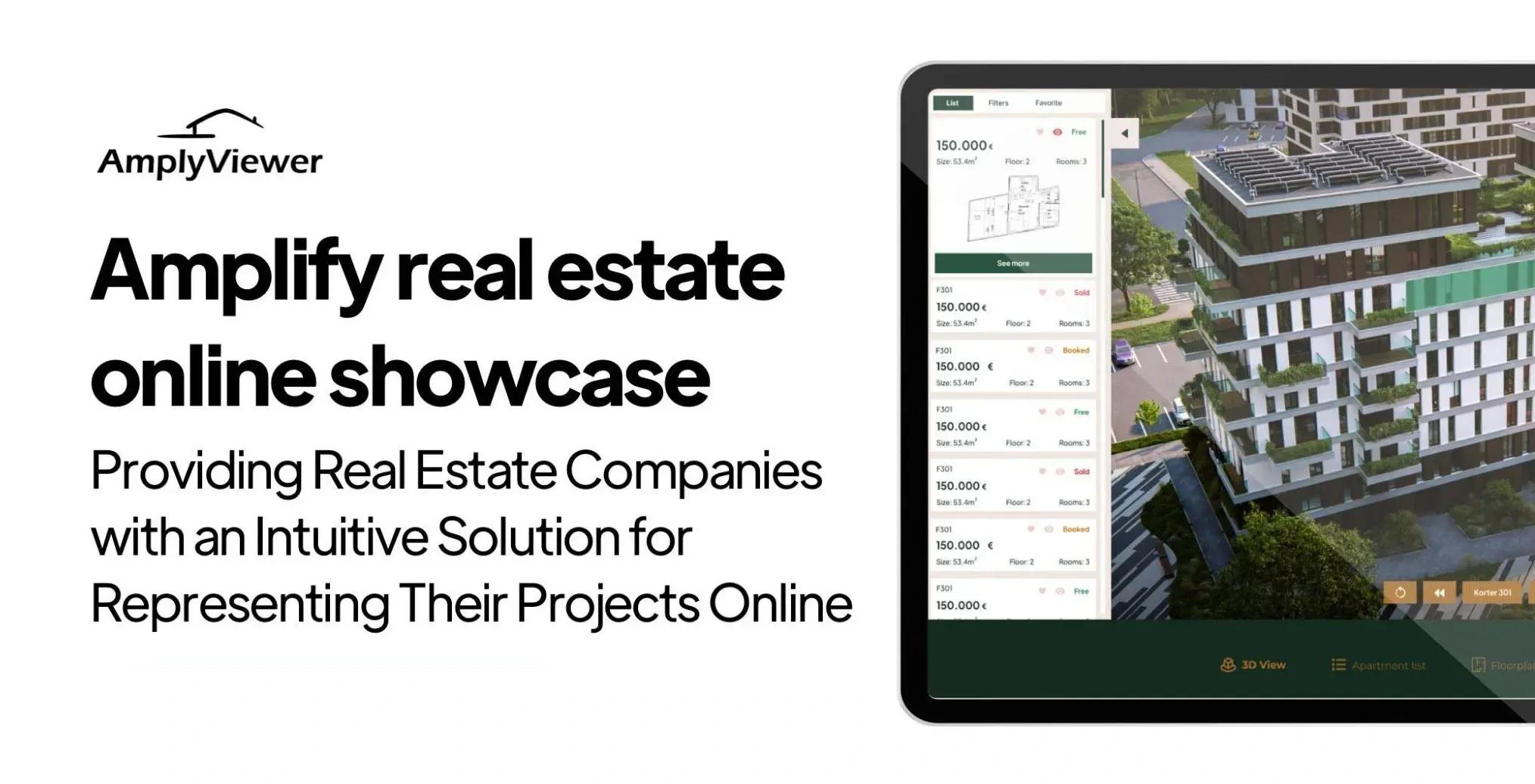
💻 Let us help you create a stunning online showcase for your projects that works seamlessly across all devices. Ready to amplify your real estate business? 👉 Explore AmplyViewer now
6. Content Marketing and Property Showcasing
Strategic content marketing drives significant traffic growth. Real estate businesses publishing 16 or more monthly blog posts generate 3.5 times more traffic than those publishing fewer posts (Source: Taylor Scher SEO). This increased visibility translates directly into qualified leads.
Effective property showcasing combines compelling visuals with engaging content. Following professional design guidelines ensures your properties stand out in competitive markets.
Content Strategy Framework
Create content that addresses specific buyer and seller pain points. Develop comprehensive neighborhood guides, market analysis reports, and property buying tips. This valuable content establishes authority while supporting SEO objectives.
Property listings require detailed, engaging descriptions that highlight unique features and lifestyle benefits. Focus on storytelling elements that help potential buyers envision themselves in the property.
Content Types and Purposes
- Market analysis reports and trends
- Neighborhood guides and local insights
- Property buying and selling guides
- Investment advice and opportunities
Content Distribution Matrix
Market Reports
- Primary Platform: Website Blog
- Distribution Method: Email, Social
Property Guides
- Primary Platform: Landing Pages
- Distribution Method: PPC, Social
Area Insights
- Primary Platform: Social Media
- Distribution Method: Organic, Email
Visual Content Excellence
Professional photography and virtual staging enhance property presentations. Create consistent visual branding across all content types. Incorporate infographics and data visualizations to explain market trends effectively.
Content Calendar Management
Maintain a consistent publishing schedule aligned with market activities. Plan content themes around seasonal trends and local events. Create content clusters that support main topics with related subtopics.
Engagement Optimization
Monitor content performance through engagement metrics and lead generation data. Track which topics and formats generate the most qualified inquiries. Use these insights to refine your content strategy and topic selection.
Interactive content elements increase engagement and time on site. Include property calculators, virtual tours, and interactive maps. These tools provide value while capturing user preferences and interests.
7. Analytics and Performance Optimization
Data-driven optimization separates top performers from average agencies. Leading real estate websites achieve conversion rates exceeding 5% (Source: Luca Tagliaferro). This level of performance requires systematic tracking and continuous optimization.
Successful digital marketing relies on comprehensive analytics and strategic performance measurement. Understanding key metrics enables informed decisions about resource allocation and strategy refinement.
Essential Performance Metrics
Track metrics that directly impact business outcomes. Focus on lead quality, conversion rates, and cost per acquisition across all channels. Monitor engagement metrics to identify content and campaigns that resonate with your audience.
Attribution modeling helps understand the customer journey. Implement multi-touch attribution to recognize all channels contributing to conversions. This insight enables more effective budget allocation.
Key Performance Indicators
- Website conversion rate by source
- Cost per qualified lead
- Lead-to-viewing ratio
- Return on ad spend (ROAS)
Channel Performance Matrix
SEO
- Key Metrics: Organic Traffic, Rankings
- Target KPIs: 20% monthly growth
- Key Metrics: Open Rate, CTR
- Target KPIs: 25% open rate
Social
- Key Metrics: Engagement, Leads
- Target KPIs: 3% engagement rate
Analytics Tools Integration
Implement comprehensive tracking across all digital channels. Configure Google Analytics goals and events to track specific user actions. Use CRM integration to monitor lead quality and conversion patterns.
Optimization Framework
Regular performance reviews identify optimization opportunities. Conduct A/B testing on key landing pages and email campaigns. Use heat mapping tools to understand user behavior and improve website usability.
ROI Calculation Methods
Calculate channel-specific ROI to guide investment decisions. Consider both direct and indirect conversion values. Factor in long-term customer value when evaluating marketing performance.
Continuous Improvement Process
Establish a systematic approach to testing and optimization. Create monthly performance reports highlighting key insights and actions. Implement changes based on data-driven decisions rather than assumptions.
Regular team training ensures effective use of analytics tools. Stay updated with platform changes and new measurement capabilities. Share insights across teams to improve overall marketing effectiveness.
Frequently Asked Questions
How much should I budget for digital marketing as an estate agent?
Start by allocating 50-60% of your total marketing budget to digital channels. Focus initial investments on your website, SEO, and one primary paid channel. Scale budgets based on performance data and ROI measurements.
Which digital marketing channel should I prioritize first?
Begin with a professional website optimized for search engines and lead generation. This forms the foundation for all other digital marketing efforts. Next, focus on the channel where your target audience is most active, typically social media or email marketing.
How long before I see results from digital marketing?
Different channels deliver results at varying speeds. PPC campaigns can generate immediate leads, while SEO typically shows significant results within 3-6 months. Content marketing and email list building are long-term strategies that build compound returns over time.
How can I measure the success of my digital marketing efforts?
Track key performance indicators including website traffic, lead generation rates, and cost per acquisition. Use analytics tools to monitor conversion rates and engagement metrics across all channels. Regular reporting helps identify which strategies deliver the best returns.
Implementation Roadmap and Next Steps
Digital marketing success requires strategic implementation and consistent execution. Start by establishing your online presence through a professional real estate website that helps you stand out. This foundation supports all subsequent marketing efforts.
30-Day Quick Start Plan
- Week 1: Website audit and optimization
- Week 2: Content strategy development
- Week 3: Social media and email setup
- Week 4: Analytics implementation and testing
Key Success Factors
Successful digital marketing campaigns share common elements: consistent brand messaging, regular content updates, and data-driven optimization. Focus on creating valuable content that addresses your audience's specific needs and questions.
Maintaining Momentum
Regular performance reviews and strategy adjustments keep your digital marketing efforts effective. Monitor industry trends and adapt your approach based on data insights. Continuous learning and testing drive long-term success.
Take Your Digital Marketing to the Next Level
Transform your property listings into immersive digital experiences that capture and convert more leads. Dignuz Design specializes in creating custom real estate websites and implementing powerful digital marketing strategies that deliver measurable results.
Ready to elevate your digital presence? Explore how our AmplyViewer technology can transform your property presentations into interactive experiences that engage buyers and drive conversions.
Get Started Today: Book a free consultation to discuss your digital marketing needs and discover how we can help you achieve your real estate business goals.
Contact us to learn more about our custom web design services and digital marketing solutions tailored for estate agents.

